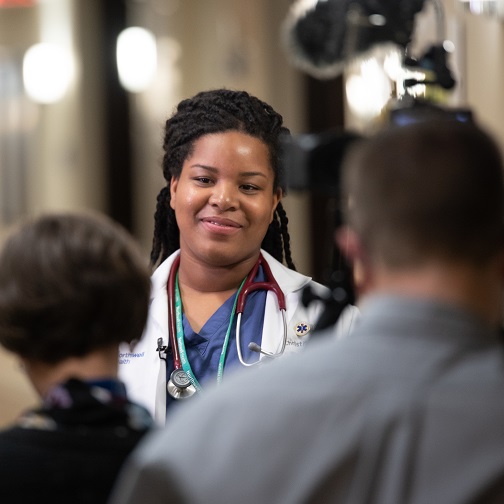About the Donald and Barbara Zucker School of Medicine at Hofstra/Northwell
Established in 2008, the Donald and Barbara Zucker School of Medicine at Hofstra/Northwell was founded by two equal partners: Hofstra University and Northwell Health. The School of Medicine is built upon the strong clinical and graduate medical education programs of Northwell, as well as the robust research and academic programs of both Hofstra and Northwell’s Feinstein Institutes for Medical Research. Ranked among the best graduate schools for medical research nationwide for ten years (2016-2025) by U.S. News & World Report, and achieving top-tier status for the past two years (2024-2025), the institution comprises more than 4,000 faculty members across 25 academic departments and enrolls a diverse community of over 400 students.
LEADERSHIP
David Battinelli, MD, Deborah and Lawrence Smith Dean
Samara Ginzburg, MD, Vice Dean, and Dean for Education, and Associate Professor of Medicine and Science Education
ACCREDITATION
Fully accredited by the Liaison Committee on Medical Education www.lcme.org
GOVERNANCE AND ORGANIZATION
Joint School of Medicine Board
Standing Committees
DEGREES OFFERED
MD: Doctor of Medicine
MD/PhD: Dual Doctor of Medicine/Doctor of Philosophy, Molecular Basis of Medicine
MD/OMS: Dual Doctor of Medicine/Certificate in Oral and Maxillofacial Surgery
MD/MA: Joint Doctor of Medicine/Master of Arts in Clinical Bioethics
MD/MPH: Joint Doctor of Medicine/Master of Public Health
MD/MS: Joint Doctor of Medicine/Master of Science in Translational and Clinical Research
MD/MBA: Joint Doctor of Medicine/Master of Business Administration
PhD: Doctor of Philosophy, Molecular Basis of Medicine
Hofstra 4+4 Program: BS-BA/MD: Dual Bachelor of Arts or Bachelor of Science/Doctor of Medicine
STUDENTS 100 per class
Students:100 per class
Annual MD Applicants: Approximately 5,000
Median Overall GPA: 3.86
Median MCAT: 518
FACULTY 4000+
HISTORICAL TIMELINE
CURRICULUM HIGHLIGHTS
The innovative curriculum at the Zucker School of Medicine fosters a learning environment that values independent study and early patient interactions. Training is divided into the First 100 Weeks (Years 1 and 2) and Second 100 Weeks (Years 3 and 4). The school also offers a unique Science Education Department, with full-time educators dedicated entirely to teaching biomedical, biopsychosocial, and clinical sciences.
- First 100 Weeks (Year 1 and 2)
- EMT Training: The First Eight Weeks
- PEARLS
- Initial and Clinical Experiences (ICE)
- Structure Lab
- Simulation Training
- Second 100 Weeks (Years 3 and 4)
- Advanced Clinical Experience (ACE) (Year 3)
- Preparation for Residency (Year 4)
RESEARCH
OUTREACH
Zucker School of Medicine staff and students participate in a variety of initiatives that connect to our local university and health system communities. These initiatives, many of which are annual and longitudinal programs, include health education in hospitals, community fairs, and elementary schools; mentoring young students and patients interested in science and medicine; volunteering at local shelters and food pantries; and supporting medical research through fundraising for childhood cancer, women’s health, and more. Students also engage with local and national organizations that support service-learning initiatives and opportunities
